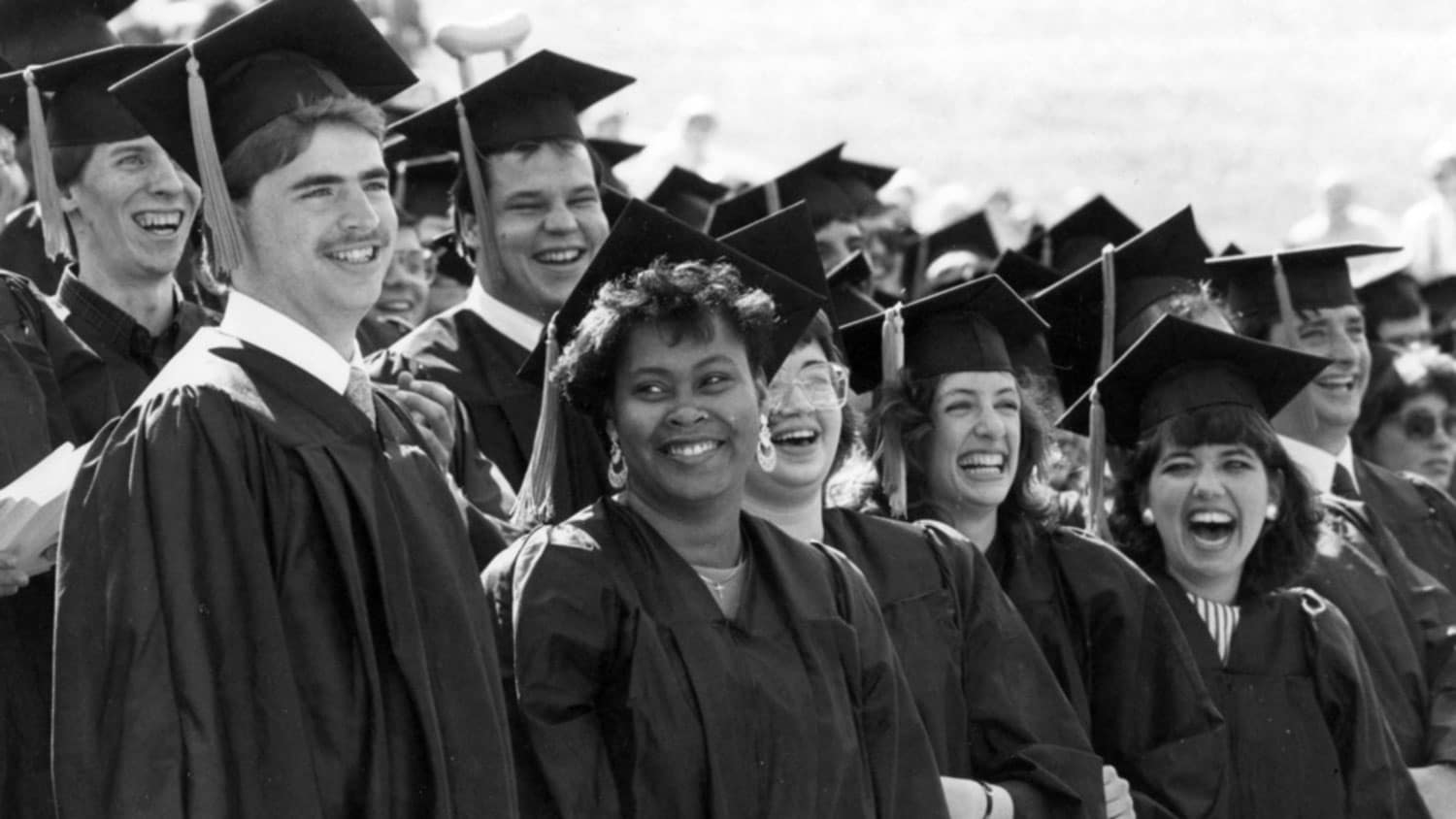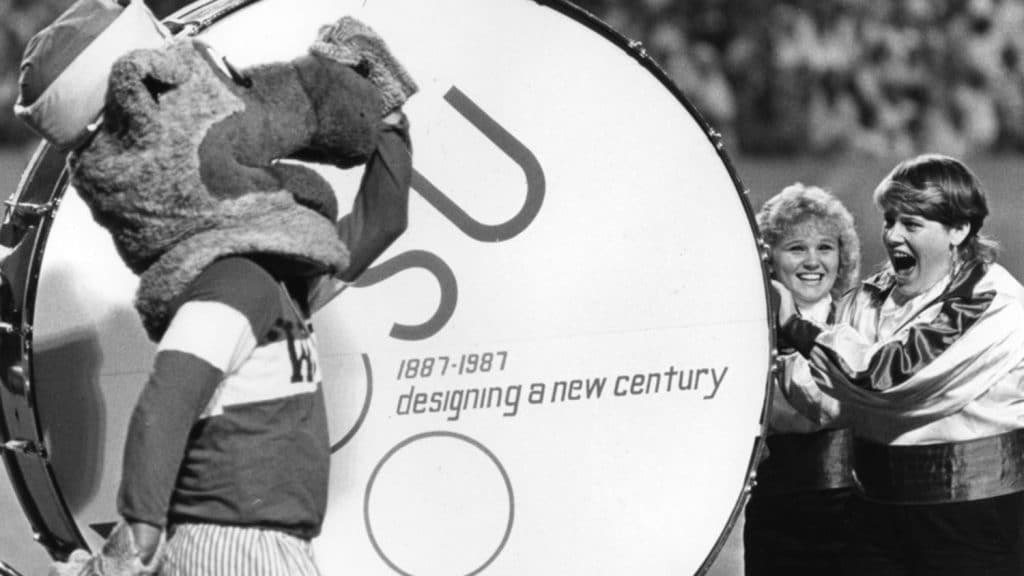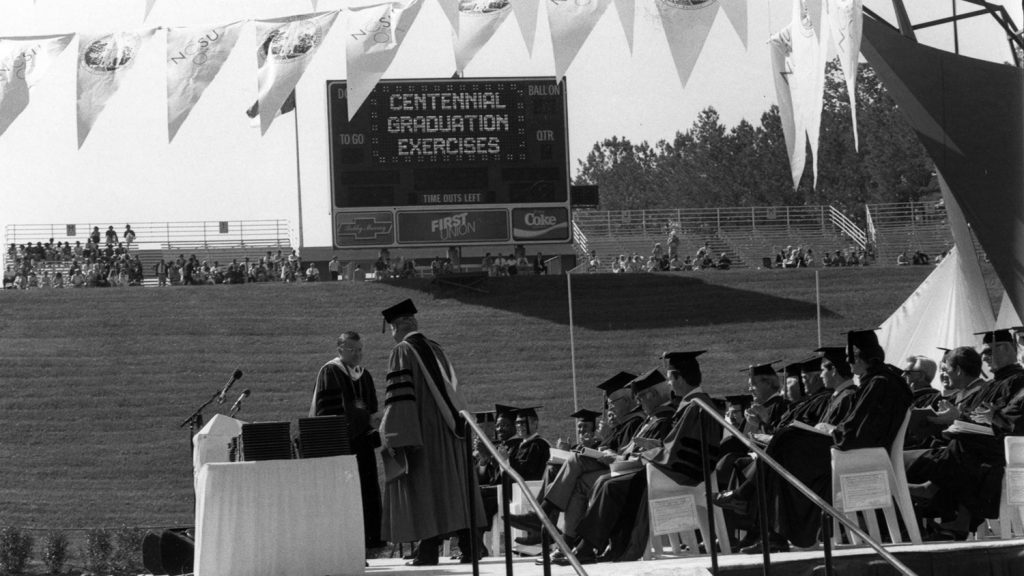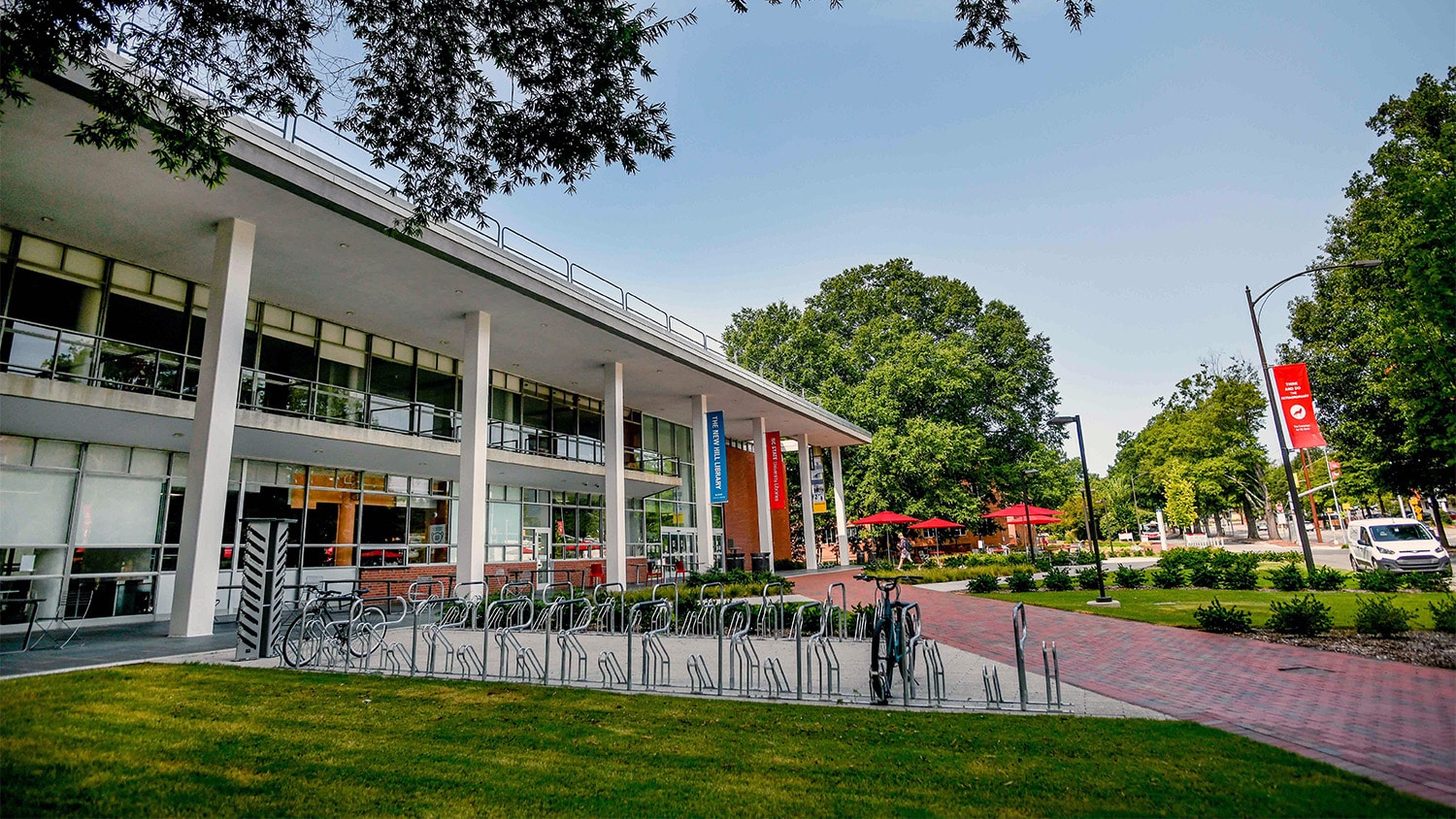A Look Back at Carter-Finley Commencement Ceremonies
As members of the class of 2021 prepare to turn their tassels at NC State's storied stadium, we revisit the university's first commencement there.

To celebrate the end of a year-long recognition of NC State’s 100th birthday, organizers of the centennial commencement in the spring of 1987 made the bold move to have the largest graduation in the history of the institution outdoors at Carter-Finley Stadium.
For more than three decades, the school’s commencement had been held in un-airconditioned Reynolds Coliseum, and moving outside for a warm spring day instead of stifling indoor heat was a welcome relief for the recipients of the 4,015 degrees conferred that morning, not to mention their parents, siblings and virtually unlimited guests.
It was an exceedingly formal affair, on a grand stage with a red-and-white backdrop in the middle of the football field adjacent to the North Carolina State Fairgrounds. All attendees were seated in the east-side grandstands, the sun rising over their shoulders for the 9 a.m. event.
The last outdoor graduation had been in 1949 at Riddick Stadium, so this was a dramatic departure for the university, just as this year’s COVID-impacted commencement will be on May 14-15 when spring commencement exercises return to Carter-Finley for the first time since 1999.
All spring commencements between 1987 and 1999 were held in the football stadium, except in 1989 when inclement weather forced it back into Reynolds Coliseum. When fall graduation ceremonies first began in 1990, those were first held in Reynolds and then the sparkling new Entertainment and Sports Arena (now PNC Arena) when it opened in the fall of 1999.
For the Centennial celebration, there were no speakers from outside the university, as the commencement committee chose to reflect on the milestone birthday by having Chancellor Bruce Poulton, its 10th chief executive, give a formal address on “Designing a New Century,” along with the three living former chancellors — Carey F. Bostian, John T. Caldwell and Joab L. Thomas — each adding three minutes of comments. Former acting chancellors Jackson A. Rigney and Nash N. Winstead were also on the stage.

Before conferring 3,073 bacculaureate degrees, 674 master’s degrees, 68 doctor of veterinary medicine degrees and 200 Ph.Ds, Poulton challenged the newest graduates to maintain “nobility of purpose,” the motto chosen by the North Carolina School for Agriculture and Mechanic Arts’ first graduating class in 1893.
“The future belongs only to those who invest in it,” he said. “There can be no purpose more noble, no investment more critical than the strengthening of young minds.”
Also on the stage with university leadership was new electrical engineering graduate Sam Spilman of Fayetteville, who was chosen to give a five-minute student address. After practicing for three months with a speech communications professor to perfect his speech, he gave what he hoped would be a memorable message to the milestone class about the meaning of true success.
“We have an expanded duty to society and to ourselves,” Spilman said, his golden tassel taped to his mortarboard to keep it still in the slight breeze. “Society will expect more of us. Willing to take an active role in our communities. It is our duty to get involved. We should be concerned about those less fortunate than ourselves. We cannot be apathetic to the needs of our fellow man.
“Let’s strive to make a difference in society.”

Spilman immediately went to work at Carolina Power & Light, the company where he had spent two summers working as an engineering intern. He’s been with that company as it has evolved into Progress Energy and now Duke Energy, in positions in South Carolina, Florida and North Carolina. Now the director of project management, he’s been back in Raleigh with wife Karen and daughter Rosemary since 2008.
He even took the time to upload his outdoor speech onto YouTube.
“It’s been watched more than 4,000 times,” Spilman says. “Almost all by my mother.”
While most agreed the outdoor Centennial commencement was a success, NC State’s student newspaper called for a bolder approach for future generations, grumbling about the profile of previous speakers.
“We deserve somebody with pizzazz — somebody with a little fame — someone not attached to this university in any way (except possibly as an honorary alumni),” a Technician editorial wrote. “This is what we want and think the class of 1988 among others deserves.
“It’s true commencement speeches don’t normally change a graduate’s life that often. Most, if not all, of the audience usually forgets whatever’s said. But it’s the thrill of actually hearing from an actual celebrity or noted politician or comedian or scientist that a graduate will remember and cherish. That’s why we urge the university committee in charge of luring guest commencement speakers to NCSU to get out and bring in someone of note. Students and graduates of this university deserve nothing less.”
Since that editorial appeared in the fall of 1987, NC State has attracted a wide swath of well-known speakers. In 1988, it was NBC news anchor Edwin Newman. In other years, poet Maya Angelou, television personalities Phil Donahue and Mr. Rogers, national politicians with North Carolina roots, military leaders like Gen. Hugh Shelton, Gen. Ray T. Odierno, Lt. Gen. Dan K. McNeill, and other people of renown.
Russell Wilson, who is now one of the NFL’s top five personalities, was preceded as commencement speaker by fellow NFL quarterback Philip Rivers in 2012, and, in the school’s first entirely virtual graduation, NASA astronaut Christina Koch this past December.
The thoughts of those alumni and guests have indeed added a bit of pizzazz to the ceremony and helped make Poulton’s final words in the Centennial address resonate through the years.
“Well, done, NC State University – no, not done, but rather, well-begun,” he said. “Surely our best years are ahead of all of us.”
Commencement Speakers at Carter-Finley Stadium
- Spring 1987: Bruce Poulton
- Spring 1988: Edwin Newman
- Spring 1989: Gov. James G. Martin (moved to Reynolds Coliseum)
- Spring 1990: Maya Angelou
- Spring 1991: William Friday
- Spring 1992: Chancellor Emeritus John T. Caldwell
- Spring 1993: Gov. James B. Hunt
- Spring 1994: Sen. Elizabeth Dole
- Spring 1995: E. Gordon Gee
- Spring 1996: Fred McFeely Rogers
- Spring 1997: U.S. Congressman J.D. Hayworth
- Spring 1998: Gen. Henry Hugh Shelton
- Spring 1999: Sen. John Edwards
- Categories:


